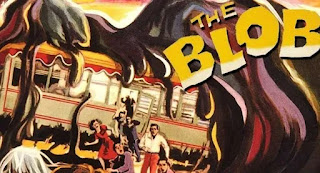"Blobitis"
by Jim Kunstler
“Our government has not failed us. To fail implies there
was at least a good faith effort to do the right thing.”
- Eric Matheny
"The new science of blobology informs us that political blobs blow up like dying stars gorging on runaway fusion.The blob expands beyond the viable limits of its internal contradictions and implodes in a spectacular vacuum of absurdity. The Washington DC blob’s dire pulsations lately signal that it’s about to blow its toxic endoplasm all over our nation’s capital, drowning many denizens in deadly slime.
Did you catch Attorney General Merrick Garland’s performance Wednesday before the House Judiciary Committee? The absurdity ran pretty rank in the chamber as the AG artfully evaded explaining how it is he doesn’t know a darn thing about the consequential cases in process at his DOJ - and if he did happen to know, he wouldn’t be able to say because… reasons.
For instance, the strange inability of one US attorney David Weiss to generate charges after five whole years of investigation in the sundry matters involving the president’s son, Hunter Biden, until the statute of limitations on tax evasion dribbled away. And then, after concocting a booby trapped plea deal on a Mickey Mouse gun rap that blew up under a judge’s scrutiny, the selfsame Mr. Weiss is appointed Special Counsel (i.e. prosecutor) over those very cases. Say, whu…? Not to mention that it’s against the regulations to appoint anyone special counsel from within the DOJ.
Well, you see, Mr. Weiss is a splendid fellow, Mr. Garland explained. When asked if he could give a working definition of professional incompetence, the AG affected to be stumped. In the course of all this play-acting, Mr. Garland maybe perjured himself several times, and he seemed painfully aware of his own possible looming legal difficulties.
One suspects through all this mummery and confabulation that Merrick Garland is not actually in charge of the US DOJ. Then who is? My guess would be the ultra low profile Deputy AG Lisa Monaco, a mitochondria of the DC blob, one of its energy cells. Ms. Monaco was up to her eyeballs in the Obama regime’s prep work for the Russia Collusion Hoax of 2016, and since her appointment as DAG in April, 2021, is a behind the scenes architect of the new American police state. The Washington Post pretends that she doesn’t exist. One also wonders when a House committee will become interested in deposing her, especially on the subject of her involvement with J-6 prosecutions.
So far, the blob has gotten away with its many depredations because the DC federal district court is one of its pseudopods, able to reach out, engulf, and dissolve anyone who poses a threat. But a turning point in America’s struggle against blobbery may have been crossed far away from there. Down in Texas, which is lately afflicted with blobitis, the state Attorney General Ken Pxton escaped an impeachment trap laid by Party of Chaos state legislators and blob allies revolving around Karl Rove and the next-gen Bush family, losing its legacy as owners of the Texas GOP.
Mr. Paxton must be royally pissed off by these shenanigans and maybe ready to rumble with blob agent Homeland Security Sec’y Alejandro Mayorkas and his putative boss, “Joe Biden.” As it happens, with Autumn here and temperatures along the border moderating, crossings of illegal aliens are at 10,000 a day. A few days after Mr. Paxton’s aquittal in the Texas Senate, Governor Greg Abbot officially declared “an invasion.” Under the US Constitution, federal failure to defend the border allows the states to repel the invaders with force. It also pretty explicitly spells out an impeachable offense against “Joe Biden” - failure to defend our country. The blob quivers and throbs."









.jpeg)


.jpeg)








